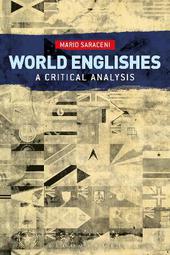
|
World Englishes: A Critical Analysis
Paperback / softback
Main Details
| Title |
World Englishes: A Critical Analysis
|
| Authors and Contributors |
By (author) Dr Mario Saraceni
|
| Physical Properties |
| Format:Paperback / softback | | Pages:224 | | Dimensions(mm): Height 234,Width 156 |
|
| Category/Genre | linguistics |
|---|
| ISBN/Barcode |
9781623562632
|
| Classifications | Dewey:427 |
|---|
| Audience | | Undergraduate | | Postgraduate, Research & Scholarly | | Professional & Vocational | |
|---|
| Illustrations |
10 Maps
|
|
Publishing Details |
| Publisher |
Bloomsbury Publishing Plc
|
| Imprint |
Bloomsbury Academic USA
|
| Publication Date |
26 February 2015 |
| Publication Country |
United States
|
Description
Winner of the BAAL Book Prize 2016 The field of "World Englishes" takes on ever more importance in the modern era. Mario Saraceni's World Englishes: A Critical Analysis looks at the developments in the field from a critical perspective. It examines the historical, linguistic, ideological and pedagogical aspects in the study of the ever-evolving forms, roles and statuses of English around the world. The principal aim is to offer a critical overview of the field in order both to inform readers about the main issues at stake and to challenge established positions and descriptive/analytical paradigms. The book has four sections, each of which reviews established accounts and offers alternative perspectives on those. "History" considers representations of the evolution of 'old English' and 'new Englishes' and begins to unveil the strong link between conventional accounts and ideological motivations. "Language" critically examines the traditional notion of 'difference' in the description of varieties of English, and discusses more recent orientations which aim to describe English as a lingua franca and the phenomenon of language hybridity. "Ideology" examines ideological debates around the presence and status of English in the world, such as linguistic imperialism, language ownership and language ecology. The final section, "Pedagogy" discusses pedagogical implications, such as the choice of appropriate 'models' of English and considers the possibility of teaching English as a fully de-anglicised language.
Author Biography
Mario Saraceni is a Lecturer in the School of Languages and Area Studies, at the University of Portsmouth, UK.
ReviewsThis book provides an accessible yet comprehensive critical perspective on the English language(s), power, and inequality. The progression of the arguments is clear and cohesive, effectively guiding the reader to arriving at a critical questioning of basic assumptions about the English language and its use around the world - and thereby providing thought-provoking pathways for advancing and re-revolutionising the WE paradigm. Through this original and challenging volume, the author adeptly achieves his aim of bringing subversion back to the heart of WE research. * Judges of the BAAL Book Prize 2016 * A distinctive contribution ... This book offers not only a good overview of the Global English debate, but also novel insights which undoubtedly support a ... growing conceptualization of Global English as non-normative and pluricentral. The strength of this contribution to the discipline lies in its multidisciplinary approach, combining diachronic and synchronic perspectives with insights from language policy, economic linguistics and language ideology. * Discourse & Society * The definite advantages of the book is its clear language, its lively and engaging style of writing and the variety of illuminating examples which illustrate the arguments of the author. * The LINGUIST List * I would highly recommend this book both to students of World Englishes and to general readers who want a well-written, accessible and up-to-date overview of the field. * ELT Journal * As the 2016 winner of the British Association of Applied Linguistics (BAAL) annual book prize, it is no surprise that Mario Saraceni's book is a superb overview of the field of World Englishes (WE). It succeeds very well in tracing the development of WE and the 'egalitarian and revolutionary ethos' that initiated it. * Journal of Multilingual and Multicultural Development * This is by far the best treatment to date of World Englishes. Saraceni integrates the history and spread of English into an expanded subject, and critically surveys the range of approaches -- structural, political, pedagogical -- that have been applied to it. His persistent 'untidying' reveals the reductionism common to all the models developed in our forlorn attempts at conceptual containment of an uncontainable linguistic reality. This he achieves with crystal clarity, pitiless jargon busting, level-headed intelligence, succinctness and humour, along with real human compassion for those speakers of World Englishes who usually get lost in the shuffle of fashionable theories. -- John E. Joseph, Professor of Applied Linguistics, University of Edinburgh, UK Mario Saraceni's new book delivers what is promised in the title, that is a 'critical analysis' of current approaches, theories, and methodologies in the study of world Englishes. The scope and range of the volume is ambitious, as Saraceni provides a contrapuntal reading of the history of the English language from 'Old Englishes' to 'New Englishes', and beyond. The core of the book provides an innovative exegesis of the theoretical origins and development of world Englishes as an academic discipline, before proceeding to suggest alternative approaches to the field. This is followed by a discussion of linguistic imperialism and resistance, as well as a final section dealing with pedagogical approaches to world Englishes. This book is recommended to a wide audience of readers. For those unfamiliar with current debates on world Englishes, this volume provides an excellent overview of the development of the field, as well as recent debates. For those working in the world Englishes paradigm, Saraceni's book is a breath of intellectual fresh air, providing an intellectually stimulating meta-commentary that reveals an impressive understanding of the subject at hand. All in all, this is a remarkable volume, and combines impressive scholarship with intellectual flair, opening up new horizons for the world Englishes paradigm. -- Professor Kingsley Bolton, Professor of English Linguistics, Nanyang Technological University, Singapore
|